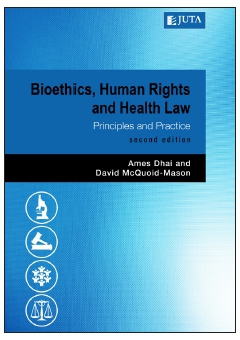Services on Demand
Article
Indicators
Related links
-
 Cited by Google
Cited by Google -
 Similars in Google
Similars in Google
Share
SAMJ: South African Medical Journal
On-line version ISSN 2078-5135
Print version ISSN 0256-9574
SAMJ, S. Afr. med. j. vol.111 n.3 Pretoria Mar. 2021
BOOK REVIEW
IZINDABA
Bioethics, Human Rights and Health Law: Principles and Practice

By A Dhai and D J McQuoid-Mason. 2nd ed. Cape Town: Juta & Co. Ltd, 2020. ISBN 9781485130727
There are many bioethical issues and dilemmas raised by medicine, healthcare and science that are of great academic, professional and public interest. Building on the first edition, the second edition of Bioethics, Human Rights and Health Law: Principles and Practice provides a highly original, practical and insightful introductory guide and resource for healthcare professionals, legal practitioners, healthcare students and law students seeking a deeper understanding of ethical and legal issues in the clinical environment. As a concise but authoritative text and reference book, it provides a unique perspective on bioethics, human rights and health law for the South African situation.
Authors Ames Dhai and David McQuoid-Mason methodically drew on their years of experience in bioethics, human rights and health law to develop a text that will equip students and professionals with the tools essential for an encyclopaedic ethicolegal examination. Drawing from modern research and incorporating case studies and real-life examples and scenarios, they illustrate how ethical concepts, human rights instruments and health law can be applied to various conflicts and dilemmas, from issues around consent and confidentiality to the use of human tissue and disputes around resource allocation. The authors have also ensured that regular reference is made to the COVID-19 pandemic and to tragedies such as the Life Esidimeni saga, indicating an appreciation of recent topics that may affect students and professionals alike.
The book is helpfully laid out in two parts. An introduction to bioethics, human rights and health law is given in part 1, and includes chapters on ethical principles, theories and values, the International Code of Ethics, health and human rights and basic health law. Part 1 serves as both an overview of bioethics, human rights and health law for those without knowledge or training in the field, and a refresher for even the most seasoned professionals and enthusiasts.
Part 2 deals with specific topics such as professionalism and healthcare, the practitioner-patient relationship, consent, confidentiality, reproductive health, HIV/ AIDS and the law, medical malpractice and professional negligence, resource allocation, the use of human tissue, human health and the environment, healthcare aspects of business ethics, death and dying, and the ethics of research. Each chapter has an introduction that is followed by an illustration of an ethicolegal dilemma or dilemmas that may be faced in a healthcare context. The authors explain pertinent concepts, discuss their implications from an ethical, human rights and health law perspective, and then offer realistic and applicable solution(s). Concluding remarks and questions on specific topics are provided, which allow readers to stay engaged and apply what they have learnt.
The easy-to-relate-to style in which this book is written makes it an essential and indispensable academic instrument for both the health sciences and the legal fraternity. The authors have made sure to avoid the unnecessary and tiresome terminology that is often evident in bioethics, human rights and health law, allowing the reader to effortlessly follow the text and discussion without losing the intention with which the book was written.
Below is a non-exhaustive list of new/ updated information contained in the revised chapters:
• The SA Patient Rights Charter
• Regulation of social media in healthcare
• Telehealth and the regulation thereof
• Issues around dual loyalty in healthcare
• Consent by children to termination of pregnancy
• Regular reference to the COVID-19 pandemic
• Alternative dispute resolution
• Ethical and legal issues regarding genomics and genetics
• Palliative care.
As a professional trained in the field of bioethics and health law, I have great regard for this book's content and presentation. I recommend it to anyone, with or without previous knowledge of the subject, who is interested in bioethics, human rights and health law.
Brandon Ferlito
Bioethics Researcher, Knowledge Management, Research and Ethics Department, South African Medical Association, Pretoria, South Africa. brandonf@samedical.org














